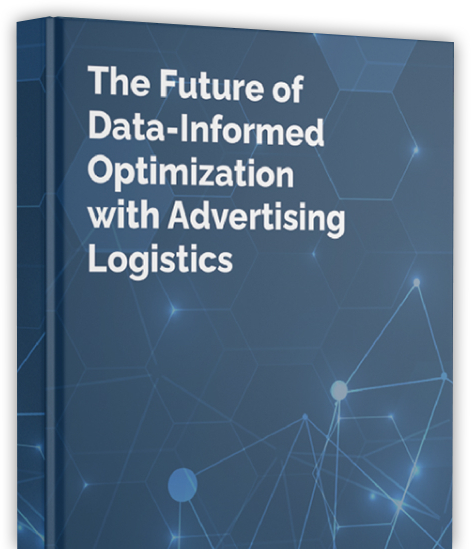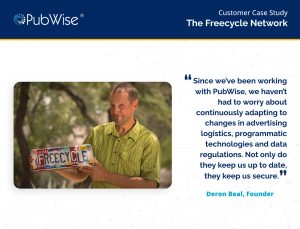Description
In times of change, be sure you don’t put all your identity eggs in one basket. In this podcast, we talk about the different solutions in the identity space and how publishers can make sure they are making the most of this opportunity. Testing options isn’t optional. In this podcast, CTO and Founder Stephen Johnston points his “tell it like it is” approach at identity and how to weather change.
Transcript
Tony Winders: Hello again, and welcome to another edition of On the SPOT. I’m Tony Winders. And today I’ll be putting PubWise Founder and CTO Stephen Johnston On the SPOT about the latest trends on identity and cookies. Stephen, I always look forward to our conversations. And I’m excited to speak with you again.
Stephen Johnston: Thanks, Tony.
Tony Winders: There’ve been a few things in the news this week that I thought would be good for us to chat about. Allison Schiff at AdExchanger did an article yesterday about Sincera, “The Ad Tech Web Crawler That Wants To Disrupt The Verification Market.” And I was really impressed by the amount of data that they’re revealing about how the different identifiers are working and which companies are being utilized with real specific percentages and numbers of publisher deployments. It was really interesting, I just wanted to get your take on that piece.
Stephen Johnston: It is interesting. And I do find their perspective interesting, in terms of it’s very compatible with a perspective that we’ve taken, which is verification in the industry for so long has focused on ad fraud. In our experience, while ad fraud from the traffic side is a drag and it’s clearly something that has to be managed, for publishers, the reality on the ground is misconfiguration, or sub optimal configurations, probably affects revenue even more if the fraud gets squeezed out of the system than what gets transacted on for real, it can be as much or more of a problem when you aren’t transacting on the valid traffic. We talked about our article, we had a blog a month or so ago about The Well Lit Digital Advertising Ecosystem. One of the things we talked about there was that it’s a non-collaborative cynical take on treating every error or misconfiguration as fraud. How do we move to more of a collaborative relationship between publisher or seller and buyer or demand and supply? And I think they’re focusing on those things. Who’s transacting on what? How do we align to those things that provide value? How do you get insight on what you should be configuring? We’ve been building for publishers, a tool similarly, to start to get answers about when I turned this on, what does it provide in terms of lift or value. Sincera is coming out from a different angle providing data to publishers. So it’s interesting, it’d be interesting to see what more they have to offer. Right now they’re very data focused.
Tony Winders: They asked a lot of questions. They’d seem to be right on your wavelength in terms of, the more information that publishers can have access to, the more they can make good decisions about how to use the data they have access to.
Stephen Johnston: I mean, the whole identity space is just exploding with companies that claim they have the next best thing. And one of the ways for publishers is to test a number of options, the PubWise platform is a way to activate those things and measure the results. When we talk about relationships of automation or AI, machine learning and the role of the human. The human still has to make big discrete decisions, like, who should I even put into competition? I think Sincera is answering some important questions there. What is the market broadly aligning to? The problem you run into in these big summary data things is, the average number of children a family has is 2.25. But when you get into this and start summarizing everything, nobody actually has two and a half children. When you get into summaries and aggregates, often the number you end up with is really the number that doesn’t exist in reality. The individual experience of a site may be different from this very summarized, global perspective data. A publisher can’t simply say, “Well, the five highest used are these and so that’s all I should use.” You have to ask questions about what the role is of those others, maybe there’s a reason that they’re used less, maybe there’s a reason that a certain identifier has a niche, maybe it’s more relevant to certain types of transactions. Maybe those transactions aren’t high volume, but they’re high value. It’s great to use this to feed human intuition and human analysis, then you need a platform to turn those things on and see what the real results are for you specifically, as a publisher. All this summary crawling data is great. It also doesn’t describe an individual publisher.
Tony Winders: Well, you predicted that there would be an explosion of these different solution providers and methodologies for alternatives to the cookie. But my question is, does it even matter? Another article that I ran across today that people are buzzing about is Garett Sloane at Ad Age wrote a piece called, “Why Google’s cookie confusion is splitting the ad industry.” Google has pushed out its cookie deprecation to the end of 2024. So it’s slipping again. I just wonder will the cookie ever go away? I have this cynical viewpoint that Google’s just a big walled garden, and they’re manipulating the industry, stringing everybody along for their own benefit, and making everybody scramble for these alternatives when the cookie was working just fine, thank you very much. What do you think about that?
Stephen Johnston: I think you’re right in your analysis, but maybe for seemingly the wrong reasons, or the wrong market force is what you’re latching on to. I think you’re right, absolutely, that Google is this large entity that’s wielding its power. But they have both a defensive end and inquisitive goal. They’re trying to defend their existing business, which does rely on things outside their, quote, unquote, “walled garden.” And then they’re trying to champion something they see as necessary. But I think that they lack or lost market credibility to be the inventor of that next solution, and it will be taken by the market. And I think they’re aware of it. They’re also being legislated against, the technical side and the ad side, communicating with the French ruling has led to more of a Chinese wall. So Google’s operating almost more like a government entity. And what they’re doing is they’re trying to set standards and targets, and then asking the industry to create solutions. And so what they’re essentially trying to do is trying to create a market force, there is going to be a need for alternatives to the cookie, we have the ability to deprecate the cookie and create the instance where that need arises. And what we’re going to do is, we’re going to keep setting this date until a real solution emerges in the market. And so what Google sliding that date tells me is that a company with multiple 10s of 1000s of engineers who’s hired some of the smartest people, people who’ve built the web, that their analysis of the identity solutions in the market is that they’re not yet ready to be cookieless. They do not solve the problem sufficiently. And so Google’s kicking the can on pulling the trigger on that.
Tony Winders: According to this Ad Age article, some people think the cookies are dead already so let’s just get on with it. And I think other people are feeling like it’s a nice reprieve.
Stephen Johnston: Who’s saying that it’s dead already?
Tony Winders: The piece is just talking about two camps.
Stephen Johnston: My gut would say that if you’re building an alternative identity solution, and you’ve got some scale, then it’s dead already. And if your company still looks at the value that cookie based solutions are providing, then you’re not yet ready. The companies that have been building these alternative solutions are chomping at the bit for Google to create that market force that creates their industry, they have a whole lot of motivation to say, “Do it, do it, do it.” because it’s the reason they exist, it’s the reason they put all this effort into these things. But Google is, without saying it, saying, “We don’t think you’re right.” I would almost look at pushing the cookie date out as an analyst report on alternative identity solutions. And that analyst report is, it’s not ready yet.
Tony Winders: Google has garnered some sympathy, though, because of how complex of a challenge it could be to rearrange the entire ad tech ecosystem. “We expected the delay to happen.” said Matt Barash at Index Exchange.
Stephen Johnston: We have hundreds of billions of dollars transacted, largely with some component of it on third party cookies and things like this. There has to be a solution or a mix of options that provide some comparable thing. At least partly because Google may be pushing that along saying, “Hey, look, we’re looking at all this legislative reality and third party cookies are going to need to go away.” They’re not going to just pull the rug out from under it, they can’t themselves. What we have is another six months or so for these guys to fight it out. There may be a solution that’s really near ready. I’m not saying that the sort of analyst analysis from Google is that they can’t be ready. But it’s that they’re not on the timeline they had set for. And Google has said a couple of times that they’re not looking at the cookie as something they want to kill. They have sort of said that they’re trying to push the market to create a solution.
Tony Winders: It was Travis Clinger at LiveRamp. Not that he said it’s already dead. He said, “Regardless of the timeline Google has set, 45% plus of the Internet is already cookieless. The time is now for publishers and marketers to control their destiny and transition away from cookie based identity.”
Stephen Johnston: I think that’s absolutely true. If something non-cookie based has to be in your arsenal, what you’re doing isn’t as a publisher. These are tech problems. And GDPR work gets done right at the last minute, once the legislation comes out. And a lot of these things that are legislative like this, get done too late. Sometimes it’s an ad industry kind of thing, the ad ops guys complaining about changes to campaigns last minute because of the pace of things. But if you’re not looking at this extension as an opportunity to figure out what you’re going to do, when it finally does happen, then you’re looking at it the wrong way. And I know that kind of sounds like, “Eat your broccoli,” and it is. It’s a matter of getting your ducks in a row. And there is a bit of a reprieve. And I think part of that is that the solutions aren’t all there. They aren’t yet providing the scale and the breadth. They may never provide the scale and the breadth just with IDs. So what may need some more time is things like predictive campaign targeting and things like that to fill the gap. Because you know, IDs aren’t the only solution. IDs are not the only thing that fills the gap of providing good campaign results, there are other ways to do targeting, you can still get measurable good campaign results, I think that measurement is a little bit more of a problem, and that is where some solutions need to be made. And some of these are sort of cultural, and they’re getting acceptance, getting people to think about, if you’re doing this predictive analysis of targeting, can we really do predictive analysis of measurement? It’s like creating data with this fuzzy math that’s hard to understand that says, “Yeah, but it’s accurate enough for our purposes.” Is it as accurate as a log level thing? It says this ID was related to this, and it’s a different kind of beast. So there’s a matter of getting industry acceptance, and all these things are in play. This is a huge change for the industry. And everybody’s wrestling with it.
Tony Winders: Why can’t universal IDs be enough? It seems like if you’re able to work with a data provider and encrypt the deterministic data that you have on a user, it should work. Is it that it won’t scale, or it won’t deploy effectively or is it about the sharing of the data?
Stephen Johnston: It’s kind of about the sharing. We tend to think of identities and cookies as the same thing, and they’re not. An ID, in this context, is the thing that identifies the user in some way. And you can have an ID that is really like a pool ID that doesn’t uniquely identify them, there are a handful of ways to do this. But we don’t always have to think of it as, that ID is the exact same thing as Tony Winders who lives at 123 Main Street, it doesn’t have to be that kind of ID. Still, it’s different from the cookie, the cookie is really the mechanism by which it’s stored on the user and shared across sites. And that’s the part that the scaling becomes tough without the cookie, it’s almost like, what we haven’t cracked is the transport mechanism. You can make an ID, that you say, “look, this is probabilistic, or it’s non deterministic so it can’t resolve to an individual user, but it can resolve to quality targeting and measurement.” There still has to be a transport mechanism for that value. And the efficient way to do that was the third party cookie. And what happened was, we said, “Here’s this ID, we’re going to stick it in a third party cookie, and now wherever you go, we can recover that ID and use it out of the third party cookie.” If you remove that, then how do you do it? That’s where some people ended up with, well, email, everybody has an email and as long as you get the same email, I get the same email then we don’t need the third party cookie to transport it and now, we’re sort of using the email infrastructure. Then it comes to things like putting it into the bidstream and resynching. At some point, you don’t actually care. The value of having the Layman perspective, the value of having Tony Windows, 123 Main Street isn’t as valuable as it sounds to most of the market. If you’re doing direct mailing, then yes, that identified thing really matters. What we really want to be able to do is say that we know things about this consumer and what campaigns they’re likely to respond to for targeting purposes. We can rediscover through other means that they’re still interested in X, Y and Z. And we can resurface that on multiple sites, and it still goes into decisioning systems within a target campaign. So knowing that the same person is more about building the profile over time, a lot of times, than it is about knowing something at a point in time about the user. And there’s a lot of value in that sort of cross pollination. It’s a tough thing, it’s like saying, from the ad industry perspective, “We’d like you all to communicate, but we’re going to stitch your mouth shut.” It’s like removing one of your senses.
Tony Winders: It’s complex. I just don’t see what was wrong with the cookie to begin with. How bad was that for privacy? It’s why I have that cynical view and maybe there are cases, but I can’t think of one where someone was materially harmed by a third party cookie identifying them.
Stephen Johnston: I think the third party cookie became a proxy for lack of control of data sharing and how data profiles were built, how they got leads, what they were used for, their exposure sort of profile of the data. We always think about, does it really matter if someone knows that I’m shopping for wine? No, not really. But if you’re diabetic, or you have a disease that may have a social stigma, then there’s more sensitivity to it. When Target sent out pregnancy products to teenagers, because they knew things, those are the things that people start to feel a little icky about. This is the classic case of killing the messenger, the third party cookie was the transport mechanism, the thing that made all that data aggregation possible. But it really wasn’t data aggregation. It’s almost impossible to unring that media, social misalignment of understanding, where the cookie is the problem. This is where crypto can play a role, maybe. If you had more of a crypto based system to understand that if you want my data, you have to sign this thing and it says what you use it for, and I need an exchange of value. And then if we had it that secure, could you put it back in the cookie because I know it’s secure cryptographically. We do see some solutions like that and their problem is always going to be scale. And when you’re doing trillions of transactions in a month, then crypto solutions don’t scale either. They don’t scale to those volumes, either based on cost of the transaction, or the cost of the time to record the transaction doesn’t do the kinds of things that we need. Quantum computing may finally lead to the real death of the cookie in 2047, we’ll see.
Tony Winders: There seem to be different entities taking up sides. If we look at the Trade Desk and UID 2.0, they have a number of partners that have signed on like Xandr, LiveRamp, Index Exchange. And then you’ve got the Advertising ID Consortium, which is AppNexus and DigiTrust. ID5 has another set of companies like Swan, yet another approach, another set of companies, some better known than others. It seems like smart people are working on this problem and the market is going to decide. It must be competitive, and maybe multiple solutions can be right, I think it’s going to unfold in another year or two.
Stephen Johnston: The ad industry has basically never settled on one way to do things. ORTB might be the closest they’ve gotten to it. I think you have to think of IDs as a two sided market problem, which is sort of a classic business model problem. And that reflects the nature of advertising. For buyers to get value, there has to be sellers, for sellers to get value, there has to be buyers. And there is always a tension between their relative appraisal of a given item that they’re transacting. IDs have the same kind of thing, which is, you need people using them to buy, to become valuable for the people who would use them to sell. You tend to find in those two sided markets, multiple players aligning to pocket to the market, whether it be a niche around something or just, who can aggregate players. Going out and communicating on both sides that you’ve solved a component of that two market problem, being able to tell sellers we have buyers, being able to tell buyers we have sellers is a key part of the marketing and the messaging. They’re all jockeying in that way.
Tony Winders: Can Prebid be a solution to this issue? They’re in the conversation of UID.
Stephen Johnston: None of this matters if publishers can’t activate it. If the solution is so inscrutable or so hard to make technically active, then everybody’s got a problem. Prebid has wanted to play a role in this because it helps everyone, as the dominant technology in header bidding. And that, as a key component in delivering programmatic advertising, makes sense that they would have a role in activating IDs. So Prebid’s had a role in activating IDs. There’s an interesting strategy beyond what you see as Prebid being involved in ID and Prebid, in essence, wanting to answer one part of that two sided market problem. And so part of their strategy there, when you look at the information they’re putting out is, publishers using Prebid can be thought of in aggregate, as the sell side of one of these IDs. Our publishers can easily activate one of these IDs. And so if you transact on it, then you can think of the whole world of Prebid users as a sell side pool, and that’s one part of that two sided market. That’s at least part of the strategy there with Prebid finding IDs, to say, “We’re going to settle on this one, so that we can at least say to the market, “You should be transacting on this one, because it’s activated easily inside of Prebid,”” And of course, Prebid is easy to activate a lot of IDs, but can they provide some better surface area to make this one a little more effective?
Tony Winders: There’s so much to unpack, and I could chat you up another 30 minutes on it, but I’m sure we’ll cover this again. We’ll have to leave it there for the moment. This has been another edition of On the SPOT. I’m Tony Winders. I really appreciate you being here and sharing all of your expertise, I always learn so much from you. Stephen Johnston, CTO and Founder of PubWise, great to speak with you again.
Stephen Johnston: Thanks, Tony.





